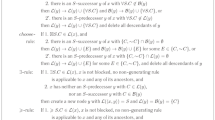Abstract
We study \(\mathcal{ALCK}_m\) and \(\mathcal{ALCS}4_m\), which extend the description logic \(\mathcal{ALC}\) by adding modal operators of the basic multi-modal logics K m and S4 m . We develop a sound and complete tableau algorithm \(\Lambda_\mathcal{K}\) for answering \(\mathcal{ALCK}_m\) queries w.r.t. an \(\mathcal{ALCK}_m\) knowledge base with an acyclic TBox. Defining tableau expansion rules in the presence of acyclic definitions by considering only the concept names on the left-hand side of TBox definitions or their negations, allows us to give a PSPACE implementation for \(\Lambda_\mathcal{K}\). We then consider answering \(\mathcal{ALCS}4_m\) queries w.r.t. an \(\mathcal{ALCS}4_m\) knowledge base (with an acyclic TBox) in which the epistemic operators correspond to those of classical multi-modal logic S4 m . The expansion rules in the tableau algorithm Λ S4 are designed to syntactically incorporate the epistemic properties. Blocking is corporated into the tableau expansion rules to ensure termination. We also provide a PSPACE implementation for Λ S4. In light of the fact that the satisfiability problem for \(\mathcal{ALCK}_m\) with general TBox and no epistemic properties (i.e., \(\mathbf{K}_{\mathcal{ALC}}\)) is NEXPTIME-complete, we conclude that both \(\mathcal{ALCK}_m\) and \(\mathcal{ALCS}4_m\) offer computationally manageable and practically useful fragments of \(\mathbf{K}_{\mathcal{ALC}}\).
Similar content being viewed by others
Explore related subjects
Discover the latest articles, news and stories from top researchers in related subjects.References
Baader, F., Calvanese, D., McGuinness, D.L., Nardi, D., Patel-Schneider, P.F. (eds.): The Description Logic Handbook: Theory, Implementation, and Applications. Cambridge University Press, Cambridge (2003)
Schmidt-Schauß, M., Smolka, G.: Attributive concept descriptions with complements. Artif. Intell. 48(1), 1–26 (1991)
Calvanese, D., De Giacomo, G., Lenzerini, M., Nardi, D.: Reasoning in expressive description logics. In: Robinson, J.A., Voronkov, A. (eds.) Handbook of Automated Reasoning, pp. 1581–1634. Elsevier and MIT Press (2001)
Baader, F., Sattler, U.: An overview of tableau algorithms for description logics. Stud. Log. 69(1), 5–40 (2001)
Horrocks, I., Sattler, U., Tobies, S.: Practical reasoning for very expressive description logics. Log. J. IGPL 8(3), 239–264 (2000)
Horrocks, I.: Daml+oil: a description logic for the semantic web. IEEE Data Eng. Bull. 25(1), 4–9 (2002)
Horrocks, I., Patel-Schneider, P.F., van Harmelen, F.: From shiq and rdf to owl: the making of a web ontology language. J. Web Sem. 1(1), 7–26 (2003)
Fagin, R., Halpern, J.Y., Moses, Y., Vardi, M.Y.: Reasoning About Knowledge. MIT Press, Cambridge (1995)
Meyer, J.-J.C., Van Der Hoek, W.: Epistemic Logic for AI and Computer Science. Cambridge University Press, Cambridge (2004)
Blackburn, P., van Benthem, J.F.A.K., Wolter, F.: Handbook of Modal Logic. Studies in Logic and Practical Reasoning, vol. 3. Elsevier Science Inc., New York, NY, USA (2006)
Rosati, R.: On the semantics of epistemic description logics. In: Padgham, L., Franconi, E., Gehrke, M., McGuinness, D.L., Patel-Schneider, P.F. (eds.) Description Logics. AAAI Technical Report, vol. WS-96-05, pp. 185–188. AAAI Press (1996)
Calvanese, D., De Giacomo, G., Lembo, D., Lenzerini, M., Rosati, R.: Epistemic first-order queries over description logic knowledge bases. In: Proc. of the 2006 Description Logic Workshop (DL 2006). CEUR (2006)
Donini, F.M., Lenzerini, M., Nardi, D., Schaerf, A., Nutt, W.: Adding epistemic operators to concept languages. In: KR, pp. 342–353 (1992)
Donini, F.M., Lenzerini, M., Nardi, D, Nutt, W., Schaerf, A.: An epistemic operator for description logics. Artif. Intell. 100(1–2), 225–274 (1998)
Baader, F., Laux, A.: Terminological logics with modal operators. In: IJCAI (1), pp. 808–815 (1995)
Lutz, C., Sturm, H., Wolter, F., Zakharyaschev, M.: A tableau decision algorithm for modalized \(\mathcal{ALC}\) with constant domains. Stud. Log. 72(2), 199–232 (2002)
Baader, F., Ohlbach, H.J.: A multi-dimensional terminological knowledge representation language. J. Appl. Non-Class. Log. 5(2), 153–197 (1995)
Mosurovic, M., Zakharyaschev, M.: On the complexity of description logics with modal operators. In: Koletsos, G., Kolaitis, P.G. (eds.) 2nd PLS, pp. 166–171 (1999)
Wolter, F., Zakharyaschev, M.: Multi-dimensional description logics. In: Dean, T. (ed.) IJCAI, pp. 104–109. Morgan Kaufmann, San Mateo (1999)
Wolter, F., Zakharyaschev, M.: Satisfiability problem in description logics with modal operators. In: KR, pp. 512–523 (1998)
Wolter, F., Zakharyaschev, M.: Dynamic description logics. In: Zakharyaschev, M., Segerberg, K., de Rijke, M., Wansing, H. (eds.) Advances in Modal Logic, pp. 431–446. CSLI Publications (1998)
Wolter, F., Zakharyaschev, M.: Modal description logics: modalizing roles. Fundam. Inform. 39(4), 411–438 (1999)
Wolter, F., Zakharyaschev, M.: Decidable fragments of first-order modal logics. J. Symb. Log. 66(3), 1415–1438 (2001)
Donini, F.M., Nardi, D, Rosati, R.: Description logics of minimal knowledge and negation as failure. ACM Trans. Comput. Log. (TOCL) 3(2), 225 (2002)
Tobies, S.: Complexity results and practical algorithms for logics in knowledge representation. CoRR. cs.LO/0106031 (2001)
Buchheit, M., Donini, F.M., Schaerf, A.: Decidable reasoning in terminological knowledge representation systems. J. Artif. Intell. Res. (JAIR) 1, 109–138 (1993)
Hladik, J., Peñaloza, R.: PSPACE automata for description logics. In: 2006 International Workshop on Description Logics DL’06, p. 74 (2006)
Baader, F., Nutt, W.: Basic description logics. In: Baader et al. (eds.) The Description Logic Handbook: Theory, Implementation, and Applications, pp. 43–95. Cambridge University Press, Cambridge (2003)
Horrocks, I., Hustadt, U., Sattler, U., Schmidt, R.: Computational modal logic. In: Blackburn, P., van Benthem, J., Wolter, F. (eds.) Handbook of Modal Logic, chap. 4, pp. 181–245. Elsevier (2006)
Lutz, C.: Complexity of terminological reasoning revisited. In: Ganzinger, H., McAllester, D.A., Voronkov, A. (eds.) LPAR. Lecture Notes in Computer Science, vol. 1705, pp. 181–200. Springer (1999)
Nebel, B.: Terminological reasoning is inherently intractable. Artif. Intell. 43(2), 235–249 (1990)
Vardi, M.Y.: A model-theoretic analysis of monotonic knowledge. In: Proc. Ninth International Joint Conference on Artificial Intelligence (IJCAI’85), pp. 509–512 (1985)
Baader, F., Hladik, J., Peñaloza, R.: Automata can show PSPACE results for description logics. Inf. Comput. 206(9–10), 1045–1056 (2008)
Author information
Authors and Affiliations
Corresponding author
Rights and permissions
About this article
Cite this article
Tao, J., Slutzki, G. & Honavar, V. PSPACE Tableau Algorithms for Acyclic Modalized \(\boldsymbol{\mathcal{ALC}}\) . J Autom Reasoning 49, 551–582 (2012). https://doi.org/10.1007/s10817-011-9232-3
Received:
Accepted:
Published:
Issue Date:
DOI: https://doi.org/10.1007/s10817-011-9232-3




